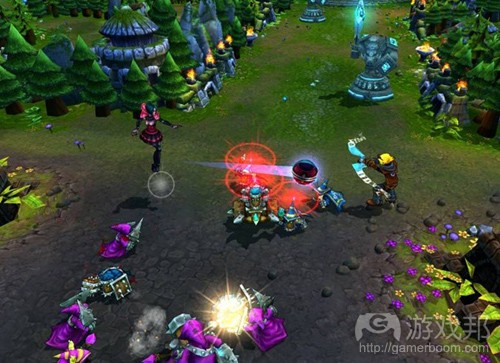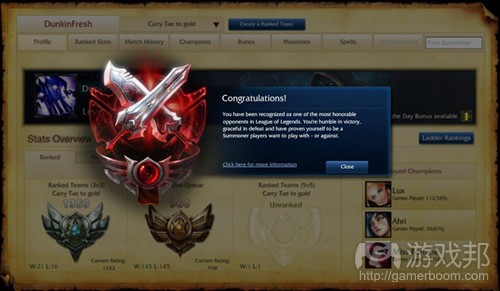电子游戏应利用积极反馈引导玩家行为
作者:Jamie Madigan
当玩家在游戏中的行为实在太“粗鲁”时,开发商要怎么办呢?雇用一支心理专家团用一个最古老的把戏处理这个复杂的行为矫正问题。
我的游戏经验丰富,但至今仍有一个盲区,那就是多人在线战斗竞技类型的游戏。这个类型包括竞技多人游戏如《DOTA》、《纽沃斯英雄》和《英雄联盟》等。我从来不玩以上这些热门游戏的部分原因可以归结为两个方面:一是难度太大,二是不太友好的玩家社区中的恶性竞争。我不喜欢因为做错了一点事就被人骂到哭。
我的想法显然没有被开发商们忽略,最近我发现《英雄联盟》的开发商Riot Games就为改善玩家行为做出努力。Riot确实有一支所谓的“玩家行为团队”,是由心理学专家、人为因素专家、统计师和相关教育领域的学者组成的。这些人的工作就是想办法让《英雄联盟》的玩家的行为更具“体育精神”。
这是一个相当复杂的问题,但是Riot似乎用一个简单的行为矫正把戏就解决了:通过对理想行为的正强化调节自发反应。
最近,这家公司很高明地推出新的荣誉系统,以引导玩家做出良好的行为。每一场比赛之后,玩家们可以给队友或对手荣誉评价,如“乐于助人”、“亲切友好”或“可敬的对手”等。评价行为积累的点数会体现在玩家资料中。玩家可以送出的荣誉数量是有限的,所以得到一个表扬是很难得的。Riot正在尝试在游戏内增加奖励,如给积累了大量荣誉的玩家发放特殊徽章和玩家角色皮肤。
Jeffrey Lin是Riot公司社交系统的首席设计师。在我问及荣誉系统的心理学基础时,他解释道:“这个系统是受到反馈循环和学习心理学的研究的启发。这些研究表明,反馈的速度和明确性是塑造行为的催化剂。”
确实,通过奖励或惩罚学习(游戏邦注:在心理学中通常与“持久的行为改变”同义)的理论可以追溯到20世纪早期的Edward Thorndike和B.F. Skinner等行为心理学家的研究。简单地说,他们发现通过将正确的行为与奖励配对,或将错误的行为与惩罚配对可以最有效地训练动物。比如,当老鼠按下一根控制杆时就给它一些可卡因(这会让它兴奋得像疯子);但如果老鼠停止按下控制杆,就拿猫吓它。
关于这种学习的研究又拓展到用于矫正人类行为和寻找给予奖励和惩罚的最佳方式。结果是,正强化(给对象想要的东西,如荣誉点)非常有效,特别是玩家执行理想行为之后马上给予的明确、有意义的奖励。
《英雄联盟》玩家的行为反馈的明确性和及时性给Riot的开发人员不少启发。“知道及时性和明确性是关键后,我们决定,在玩家做出积极的行为后,马上就弹出一个可见的窗口,明列玩家的积极行为类型。我们要显示出玩家因为什么行为而获得荣誉,而不只是显示玩家获得4点荣誉值。”
所以及时性和明确性对于创造行为和奖励之间的联系是非常重要的。不过我认为还有另一个方面也促进了荣誉系统的成功:它的反馈时间表——也就是,因理想行为而获得的奖励多久出现一次。例如,如果你每十次游戏就得到一次这种配对奖励,那就叫作固定率时间表。如果你每十分钟完成一个配对,那基本上就是固定的间隔的时间表。
但《英雄联盟》中的荣誉不是根据这两种时间表发放的。相反地,它更像一台老虎机,因为即使你在比赛中表现得体,你也不能肯定其他玩家会不会给你荣誉点,所以一切都是随机的。但你会渐渐地明白,如果你的行为始终符合“体育精神”,那么你得到荣誉的机会也会更多。所以,这种随机或变量性强化计划表是改变长期行为的最有效方式之一。
但是,我们还是回避了问题的本质:奖励如荣誉比惩罚如羞辱或甚至禁止更加有效吗?乍一看,我们似乎一致同意奖励比惩罚有效得多。许多育儿专家、训狗师和管理学专家都持这种观点。但根据我写本文时参考的文献,这个话题其实还存在争议。奖励和惩罚哪个有更有效?这很大程度上取决于你要改变的人属于哪一类型。由Daniel Balliet、Laetitia Mulder和Paul Van Lange整理的一份2011年的荟萃分析(一种结合了许多个体研究资料的分析)表明,在社交困境类游戏中,为了让人们合作而采取的奖励和惩罚是同样有效的。人类本身和人类互动就是复杂的,所以这个问题很难下定论。
但很清楚的一点是,综合使用奖励和惩罚的效果应该会非常好,所以看到Riot采取这种类似棍子加胡萝卜的手段来促进玩家的理想行为,我感到高兴。另外,这种措施也表明,赢得比赛不是最重要的事;获得良好的体验才是我们玩游戏的原因。正如Jeffrey Lin所说的:
一名玩家刚刚结束了一场糟糕的比赛——每个人(包括他自己)都知道他其实是队伍中实力最差的玩家。他觉得失落,正在考虑要不要换一场比赛。突然间,一个窗口弹出来,告诉他:“嘿,你的两名队友觉得你非常友好;你的一名队友觉得你是一个很棒的队友。”
就在这一刻,一切都改变了。是的,你确实表现很差,害你的队伍输了,但没关系。如果没有这个系统,这名玩家可能会带着糟糕的心情离开游戏。现在,我们已经将消极体验变成积极体验。
多人游戏是一种社交互动。我们在游戏中的行为难道不应该像在社交活动中一样受到奖励或惩罚吗?(本文为游戏邦/gamerboom.com编译,拒绝任何不保留版权的转载,如需转载请联系:游戏邦)
Modifying player behavior in League of Legends using positive reinforcement
By Jamie Madigan
What does a game developer do when its players have a bit of a reputation for being insufferable jerks? It hires a team of psychologists to tackle complex behavior modification problems with one of the oldest tricks in the book.
One of the blind spots in my gaming experience is the multiplayer online battle arena (MOBA) genre, which consists of competitive multiplayer games like DOTA, Heroes of Newerth, and League of Legends. Part of the reason I’ve never jumped in to any of these massively popular games is the one-two combination of a daunting learning curve and their reputation as homes to hyper competitive and none-too-pleasant player communities. I don’t like the idea of doing the wrong thing and getting yelled at until I cry. It’s why I don’t go to elementary school anymore.
This hasn’t escaped the attention of developers, of course, and I recently learned about efforts by Riot Games, makers of League of Legends, aimed at improving player behavior. Riot actually has a “Player Behavior Team” consisting of psychologists, human factors specialists, statisticians, and similarly educated folks who stand around in lab coats and experiment with ways to make League of Legends players act with greater sportsmanship.
It’s a hugely complex problem, but Riot seems to be using a simple behavior modification trick straight out of Psych 101 to tackle it: operant conditioning through positive reinforcement of desirable behavior.
To wit, the company recently launched a new Honor system to reward good behavior. After each match, players can give teammates and opponents accolades across categories like “Helpful,” “Friendly,” or “Honorable Opponent.” Points from these accumulate and are made visible in each player’s profile. Players are limited in how many Honor awards they can dole out, so getting one means something and Riot is experimenting with in-game rewards like special badges and player character skins for players who amass lots of Honor.
“The Honor feature was inspired by research on feedback loops and the psychology of learning,” Jeffrey Lin, Lead Designer of Social Systems at Riot, told me when I asked him about the psychological roots of the system. “One pillar of this research suggests that speed and clarity of feedback are catalysts that can really shape behaviors.”
Indeed, learning (which in psychology is often synonymous with “lasting behavior change”) via reinforcement or punishment dates back to research in the early 20th century by pioneers like Edward Thorndike and B.F. Skinner. In brief, they found that animals could be trained most effectively by pairing rewards or punishments with desired or undesired behaviors. Give a rat a pile of cocaine each time he presses a lever and it will jam on that thing like a maniac. But give the rat a pile of cats and it will stop pressing the lever. Or something like that.
Research on this kind of learning developed and expanded, including its use in modifying human behavior and understanding the best ways to schedule and present the rewards and punishments. It turns out that positive reinforcement (adding something the subject likes, like Honor points) is super effective, but even more effective when presented unambiguously, meaningfully, and quickly after the desired behavior.
These lessons about specificity and timeliness of feedback for League of Legends players were taken to heart by the folks at Riot. “Knowing that speed and clarity are key,” notes Lin, “we opted to give players an extremely visible pop-up that clearly outlined the specific types of positive behaviors the player had engaged in immediately after each game. Instead of just showing that a player earned 4 Honor points we show the player the exact types of behaviors that they were Honored for.”
So timeliness and specificity are important to creating associations between behaviors and rewards, but there’s one other facet of the Honor system that I think makes it work: its feedback schedule –that is, how often you pair the reward with the desired behavior. For example, if you make the pairing every tenth time and that’s called a fixed ratio schedule. Do the pairing every ten minutes and that’s basically a fixed interval schedule.
But Honor in League of Legends isn’t given out according to either of those schedules. Rather, like a slot machine it’s essentially random since even if you behave yourself in a match you never know for sure if another player will give you Honor or not. But you learn that over time, if you exhibit good sportsmanship consistently, you’ll get Honor a lot more often. Turns out that random or variable ratio reinforcement schedules are among the most effective way to change behavior in the long term. (For more on why this is, see my article on neurotransmitters and random loot drops in World of Warcraft.)
This all begs the question, though: are rewards like Honor more effective than punishments like shame or even banning? At first blush it seems that the consensus is that rewards are far more effective than punishments. That’s the attitude shared by many child rearing guides, dog trainers, and management gurus, anyway. But in the literature review I did while writing this article, it became clear that there is actually still considerable debate about the topic, and a lot of it depends on the type of people you’re trying to change. A 2011 meta analysis (a kind of superstudy that combines data from many individual studies) by Daniel Balliet, Laetitia Mulder, and Paul Van Lange, for example, found that positive reinforcement and punishment are about equally effective for getting people to cooperate with others in social dilemma type games. Humans and human interactions are complex, it turns out, so there’s little room to be definitive on the topic.
What is clear, though, is that a combination of rewards and punishments can be pretty darn effective, so it’s nice to see companies like Riot using the stick, the carrot, and whatever else it can get ahold of. Plus, it changes the scorecard to make clear that winning a match isn’t everything that matters. Having a good experience is why we play games. As Jeffrey Lin at Riot explained it:
Consider a player that just had a poor game–everyone (including him!) knew that he was the worst player on the team. He’s feeling a bit down and is considering whether to play another match at all after such a terrible performance. Suddenly, he gets a pop-up after he leaves the game that says, “Hey, 2 of your teammates thought you were really friendly and 1 of your teammates thought you were a great teammate.”
That moment changes everything. Yes, you were the worst and your team lost, but it’s OK. Without the system, this player might have just logged off with a bitter taste in his mouth. Now, we’ve nudged the negative experience into more positive territory.
Multiplayer games are social interactions. Shouldn’t our behavior in them should carry the same costs and rewards as it would anywhere else? (source:gamasutra)









































 闽公网安备35020302001549号
闽公网安备35020302001549号